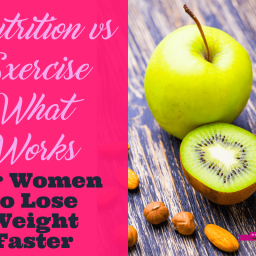A single intervention is rarely enough to produce maximum weight loss.
There are usually multiple fattening habits that need to be addressed and changed for everyone who is overweight.
One such habit is not drinking enough water.
In this article, we will discuss how water affects your metabolism, satiation and what tricks you can use to consume more.

- How drinking water helps with losing belly fat
- Follow these 12 tricks
to drink more water and benefit your weight loss goals:
- 1. Set the proper limits for water consumption
- 2. Set goals and gradually increase your water intake
- 3. Track the amount of water you drink
- 4. Set reminders
- 5. Drink before meals
- 6. Drink during exercise
- 7. Replace any calorie drinks with water
- 8. Always keep a bottle with you
- 9. Drink the water that you prefer
- 10. Add some taste
- 11. Keep a glass on your bed stand
- 12. Eat more foods high in water
- The bottom line on how women can slim down by drinking water
How drinking water helps with losing belly fat
Multiple scientific evidence shows benefits from drinking more water in terms of weight loss.
A study was performed, involving 173 overweight women aged 25-50. They were all consuming less than a liter of water per day.
The study showed that after increasing their water intake, there was a significant reduction in their body weight and fat over a period of 12 months (1).
A literature review of multiple studies points out a possible connection between the levels of hydration and some hormones, affecting the metabolism and risk of diseases (2).
There have been studies showing that consumption of water might also increase the resting energy expenditure (3).
Resting energy expenditure is the amount of calories that we burn for just maintaining the function of all organs, tissues, and cells in our body and keep us alive.
It makes up for the most amount of the calories that we burn every day (4).
One study found out that consuming water boost resting metabolic rate for a short period with more than 25% (5).
However, not all evidence supports the theory for boosting the metabolic rate (6).
The most likely reason for increased weight loss with higher water consumption is helping us reduce our energy intake and improvement of overall health.
Take-Away:
Drinking more water is associated by multiple pieces of evidence to be helpful with weight management. This is due to improvement in the basic metabolic rate and mostly due to the suppression of hunger.
Follow these 12 tricks to drink more water and benefit your weight loss goals:
1. Set the proper limits for water consumption
First of all, you need to know what the generally recommended amounts for water intake are every day.
While most people do not consume enough water there are also cases of water intoxication.
The total amount of water needed for a person depends on many factors, such as gender, age, body weight, physical activity, illnesses, body temperature, and ambient temperature.
While for most people thirst levels are adequate, children, elderly or sick people might not experience it properly and drink less water than their bodies need.
Despite the multiple factors that determine individual needs, under 2 liters daily is considered generally insufficient for regular adults by scientific evidence (7).
The article suggests that consuming less than 2 liters daily might affect negatively metabolism and chronic conditions.
Too much water is not healthy either. There have been cases of water intoxication caused by drinking 6 liters for just 3 hours period (8).
Such excessive water intake causes hyponatremia, which can vary from a mild to a serious condition (9).
Symptoms include headache, confusion, irritability, nausea, vomiting, seizures and even coma.
On the other hand, consuming 2 liters for an hour of excessive sweating and physical activity is completely safe, so again, there are multiple factors determining the optimal daily amounts of water for each individual.
Take-Away:
For a healthy lifestyle, we should drink at least 2 liters of water per day. However, in cases of extreme over-consumption, there is a risk for water intoxication.
2. Set goals and gradually increase your water intake
Goal setting is an effective strategy for many aspects of weight loss.
Many behavioral changes can be successfully achieved by creating a plan with realistic goals (10).
This is also applicable for increasing your water intake in order to slim down, for example by setting a daily goal.
An adequate daily goal would be staring at 1.5 liters for 24 hours and increase that amount with half a glass every day.
Depending on many factors including your physical activity and body weight you should try to reach at least 2 liters per day or preferably more.
According to the American National Academies of Sciences, Engineering, and Medicine, the recommended amount of water intake for women is at least 2.7 liters daily and 3.7 liters per day for men.
Take-Away:
The recommended amounts that we should aim for are at least 2.7 liters for women and 3.7 liters for men. We should gradually increase our daily intake until we reach those levels.
3. Track the amount of water you drink
In order to make sure your intake of water is adequate, self-monitoring is crucial.
Self-efficacy and regulation have been shown by studies to help behavioral change and weight loss (11).
For example, you can list down the number of cups or bottles that you have consumed in a diary or mobile app.
You can also have a marked water bottle for easy tracking.
Another option is to use hair ties or something similar to remind you how much you have left to drink for the day.
For example, you can swap it from a wrist to the other when you have finished a bottle.
Take-Away:
Self-monitoring can be helpful for every aspect of your weight loss plan, including the amount of water you drink every day.
4. Set reminders
Very often we are too busy to drink water, so we keep forgetting to refill our cup or we are always on the move and forget about our bottle.
An easy way to consume enough water despite your busy schedule is to set reminders.
There are many mobile apps out there that can remind you every hour or every few hours to drink water with sound or message on the screen.
Such a message will prompt you to drink water every time you look at your phone for example.
Very successfully you can also set your phone alarm on regular intervals to remind you about water, although screen message is a better idea.
You can also stack your habits and use another habit as a cue to drink water. For example, every time you use the restroom or when opening the fridge.
It is better to have something else like an app to remind you of such habits instead of constantly thinking about it.
Take-Away:
Setting reminders such as phone apps or using other habits as cues is a successful strategy to drink more water throughout the day.
5. Drink before meals
The best habit you can create is drinking water prior to a meal. Not only it helps you stack the habit with another, but it also reduces the amount of food you eat.
The water creates volume in the stomach and you restrict your caloric intake without having to think about it.
A study performed with 24 overweight or obese adults allowed them to eat as much as they want during breakfast, however half of those subjects had to drink 500ml of water prior to the meal.
The study showed that such preload with water reduced the amount of energy consumed during breakfast with approximately 30% (12).
Another study with 48 overweight participants who were again split into two groups – with or without 500ml of water prior to every meal compared the effect in the long term.
After 12 weeks, the group that consumed 500ml prior to every meal had a 44% greater reduction in weight and body fat compared to the other group (13).
Another study, having 50 participants consume water 30 minutes prior to every meal showed improvement in body weight, body fat, and appetite control (14).
Despite the benefits, there have been claims and concerns that water during a meal might dilute the stomach acids and enzymes and disturb normal digestion.
However, the stomach itself secretes water, along with acid and enzymes during digestion.
In fact, the water is needed to provide an environment as a solvent for the proper function of these chemicals.
Studies show that our gastrointestinal system is highly adaptive to the contents of our food and deal equally well in terms of digestion, no matter if the meal is mostly solid or liquid (15).
Another false claim about consuming water with or prior to a meal is faster stomach emptying.
No such phenomenon has been observed by science (16).
Take-Away:
Drinking before each and every meal is proven to produce the best weight-loss results related to consuming more water. Also, you can use hunger as a reminder to drink water.
6. Drink during exercise
The need for water intake raises during and after exercise.
A scientific article on dehydration of professional athletes in different sports shows that the needs for water during physical activity raise significantly above 3 liters per day (17).
It also shows that the loss of water measured as more than 2% of body weight during physical activities significantly affects performance.
Other studies also find a strong correlation between the level of hydration and physical performance (18).
This is why it is important to drink enough water during any form of physical activity.
Depending on the ambient temperature and the intensity of the exercise the daily needs for water might even double.
Take-Away:
Drinking water during exercise is very important for preventing dehydration and cramping, as well as supporting your overall physical performance.
7. Replace any calorie drinks with water
Another way to stay more hydrated and reduce your caloric intake is to replace any juices, soft or energy drinks with water.
These drinks are often rich in sugar and other simple carbohydrates and they should be restricted.
According to medical recommendations, sugar should not be more than 10% of your total daily energy intake.
A systematic review shows that when water is used instead of sugar-sweetened beverages this results in an almost 8% reduction in the total amount of calories consumed (19).
Furthermore, according to a qualitative review, when water is not paired with such drinks or meals that also increase insulin rapidly, it boosts fat oxidation in the body (20).
The problem with sugar is not just the calories, but also the lack of satiety after consuming it.
Liquid calories provide no feeling of fullness and increase the risk of consuming too many calories and gaining weight.
Take-Away:
Replacing caloric drinks with water is proven to reduce significantly the energy intake and weight of participants in studies.
8. Always keep a bottle with you
Always keeping a bottle around with you is handy for drinking more water.
This way you can drink water no matter when and where – home, work, school, traveling, shopping, working out, etc.
It is also a visual reminder to drink more throughout the day.
Buying a new, fun, and reusable water bottle will make it easier to adhere to your goals.
It is a good idea to choose an attractive water bottle and carry it everywhere like an accessory.
Also having a reusable water bottle is better for the environment.
Take-Away:
Having a bottle always handy will serve as a reminder and allow you to consume it at regular intervals throughout the day.
9. Drink the water that you prefer
Choosing between different types of water makes little to no difference. You should experiment with different types and choose the one you prefer the most.
Even tap water in many countries is safe to drink, like for example most of the tap water in America.
The most economical and ecologically friendly way to drink quality water is to use a filter for tap water.
This is a much better option than constantly buying and then throwing away plastic bottles. Often bottled water is not even of higher quality than tap water.
Such filters reduce the risk of waterborne bacteria, toxins, and pollutants. Also, they can improve the taste of the water.
Take-Away:
You should choose to drink the water that you like the most. Water filters are a great ecological and non-expensive option to improve the quality of your water.
10. Add some taste
For some people, it is helpful to add some flavor to the water, in order to drink more.
The easiest way to do that, without adding any calories is to add some fruit to the water, like a piece of lemon, lime, kiwi or cucumber for example.
Do not add fruit juices into the water, because then you will add calories too instead of just flavor.
Also be careful with artificial flavors, as some might contain sugar.
While artificial sweeteners have 0 calories and most are considered safe, you should not use them excessively.
Although they are free of calories, their sweet taste stimulates our brain to crave sweet foods much more often (21).
Despite claims that artificial sweeteners such as aspartame might cause diseases such as cancer, epidemiological studies have not found such a relationship (22).
Other artificial sweeteners like saccharin might have a negative effect on our gut bacteria as shown by scientific evidence (23).
Nevertheless, fluids with calorie-free sweeteners are shown by science to help reduce caloric intake, like water and support weight loss (24).
Intervention studies provide evidence that compared to drinks with added sugar, consumption of those with artificial sweeteners without calories resulted in 24–31% less belly fat, 32% lower cholesterol levels and 10–15% lower blood pressure.
Adding fruit pieces to the water is preferred and you can also experiment with different fruit combinations to suit your tastes.
Take-Away:
Adding flavor to the water with fruit pieces can be helpful to increase the amount of water you drink. Calorie-free sweeteners can also be helpful, but you should use them sparingly.
11. Keep a glass on your bed stand
Keeping a glass of water near you while you sleep can prove quite handy during the middle of the night.
It will reduce the risk of disturbing your sleep as it is much easier to just grab the glass and go right back to sleep then walking to the kitchen.
Sleep is extremely important for weight loss.
A cohort study of 83,377 men and women found an association between self-reported sleep duration and weight management (25).
Compared to 7-8 hours of sleep, shorter durations are associated with a higher risk of weight gain.
A meta-analysis of more than 30 studies including over 600,000 participants found consistently increased risk of obesity amongst short-sleepers in both children and adults (26).
Also not having to walk to the kitchen reduces the risk of night eating.
Night eating is proven by science to be a fattening habit, which significantly increases the risk of obesity (27).
Also, according to studies, the organism sometimes mistakes the signals for hunger and thirst (28).
So, drinking water first is a great idea to distinguish actual hunger from thirst in the middle of the night.
Take-Away:
Having a glass of water nearby if you wake up hungry or thirsty at night is helpful for preventing losing your sleep and night eating behavior.
12. Eat more foods high in water
You can also get lots of water with foods such as fruits and vegetables.
Because of their water content, they have low caloric density and help with creating a feeling of fullness faster.
A study shows that fruits and vegetables are inversely associated with weight change – higher the consumption, lower the weight (29).
The fruits that are the highest in water are:
Watermelon – 92%
Strawberries – 92%
Grapefruits – 91%
A study showed that eating grapefruit before meals significantly reduces energy intake and results in weight loss (30).
Some of the vegetables that are very high in water content are:
Cucumbers – 96%
Lettuce – 96%
Celery – 95%
Tomatoes – 95%
Tomatoes, for example, are also healthy because they contain lots of potassium, vitamin C and other antioxidants, such as lycopene.
Potassium is helpful for the reduction of high blood pressure.
Studies show that the consumption of tomatoes reduces inflammation and cardiovascular risk (31).
The recommended amount of fresh fruits and vegetables is at least 400 grams daily.
Take-Away:
Water from water-rich foods is also helpful to control your hunger. Some fruits and vegetables are also rich in healthy nutrients such as vitamins and minerals.
The bottom line on how women can slim down by drinking water
Drinking more water is proven to be helpful for the reduction of body weight.
The mechanisms include improving our metabolism as well as creating volume in the stomach that helps us achieve satiation faster.
This is why the most efficient habit is to drink water prior to a meal, as this is proven to reduce the total amount of energy consumed and help with weight loss.
It is important to replace bad, fattening habits with healthy ones such as drinking more water in order to lose fat successfully.





